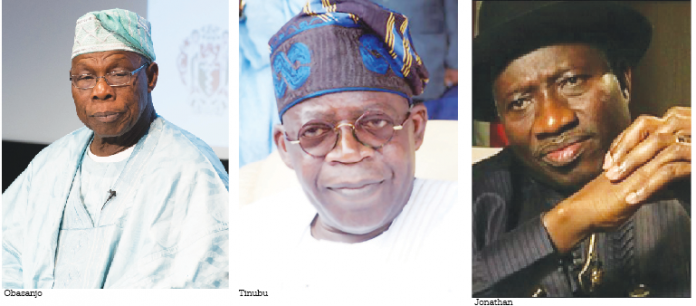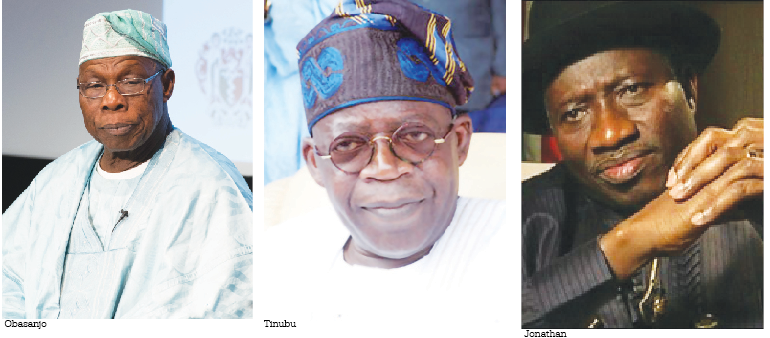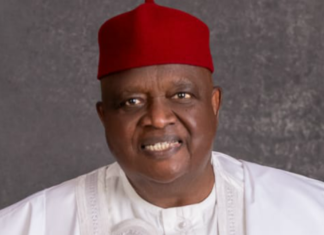Assistant Politics Editor, DANIEL KANU, examines President Muhammadu Buhari’s anti-corruption battle and issues that have the potential of smearing the campaign.
The promise
President Muhammadu Buhari during the electioneering that led to his election promised Nigerians that one of his cardinal programmes would be the fight against corruption. He was unequivocal on his position that he would declare massive anti-corruption war and ensure that corrupt officials implicated during probe would face the wrath of the law.
Since after his inauguration, he has remained vocal on his corruption mantra, assuring that there will be no mercy for persons who looted Nigeria’s resources while in public office.
The retired General, last month, in faraway United States of America (U.S.A.) again raised the hope of Nigerians on the anti-corruption war when he vowed to retrieve all the monies stolen by ministers who served under former President Goodluck Jonathan.
During the tour, he confirmed that there was evidence of massive looting and stealing of Nigeria’s crude oil by some government office holders, saying the former ministers’ names are being compiled by relevant agencies for possible prosecution.
He vowed that his administration would trace all the accounts of individuals who stashed away ill-gotten oil money, freeze such accounts, recover the loot and prosecute the culprits.
“As soon as possible, we will approach those countries to freeze such accounts, prosecute the culprits and return the monies to Nigeria.
“The amount involved is mind-boggling. Some former ministers were selling about one million barrels of oil per day. I assure you that we will trace and repatriate such money and use the documents to prosecute the culprits.
“A lot of damage has been done to the integrity of Nigeria with individuals and institutions already compromised,” Buhari noted.
Observers seem to agree that corruption has become so hydra-headed, even systemic in Nigeria, that if the country must be salvaged, there must be every attempt to stamp it out.
There are also some commentators who are of the opinion that successive administrations seem to have treated the fight against corruption with levity, leading to the cry for reforms in all sectors of the economy, if we must survive as a nation.
Setting the stage
To show that he means business, Buhari has appointed a Presidential Advisory Committee against Corruption headed by Itse Sagay, a prominent, no-nonsense professor of law and civil rights activist.
The committee’s brief, according to a statement by Special Adviser to the President on Media and Publicity, Femi Adesina, is to advise the present administration on the prosecution of the war against corruption and the implementation of required reforms in Nigeria’s criminal justice system.
Already, Sagay has urged all those who have soiled their hands by dipping it in the public till to come forward and confess, assuring that certain lenient terms can be obtained by doing so. He assured that the fight against corruption will not be selective, even as he disclosed that the agenda for the anti-corruption committee was still being worked out by the federal government.
“All of us have a responsibility to assist this government to fight corruption, which is the greatest scourge confronting this country today,” Sagay told TheNiche.
Dismissing claims that the war against corruption was selective, he said: “As for the question of selectivity, let me put it this way: any person, who has not been guilty of corruption, who has not looted the funds of Nigeria, has no cause for alarm. So, all this escapist attitude of talking of selectivity and victimisation cannot arise; you cannot victimise an innocent man.
“And anyone who knows that his hands are dirty should come out and confess. I am sure, certain lenient terms can be obtained by him; but let them not hide under the cloak of selectivity, ignoring that their hands are deep red with guilt.
“For me, there is no selectivity; it is plain and straightforward. Those who have looted the country’s funds are going to be requested to return them and, in fact, prosecuted if necessary. It has nothing to do with selectivity.”
On Tuesday, August 11, Buhari during a meeting with members of the National Peace Committee headed by former Head of State, General Abdulsalami Abubakar, was vehement in his tone, that his government was “irrevocably” committed to doing all within its powers to break the vicious cycle of corruption as well as tackle unemployment and insecurity in the country.
Said Buhari: “Nigeria has to break this vicious cycle before we can make progress. We have really degenerated as a country. Our national institutions, including the military, which did wonderfully on foreign missions in the past, have been compromised. But we are doing something about it. The military is now re-training and morale has been resuscitated. We cannot continue this way, if we must move forward.”
Wrong signal
Most Nigerians have criticised the Department of State Services (DSS) operatives on the way some government officials who worked under Jonathan are treated, fuelling the fear of a witch-hunt agenda.
For instance, the treatment of immediate past National Security Adviser (NSA) Col. Sambo Dasuki, and Jonathan’s Chief Security Officer (CSO), Gordon Obuah, was quite condemnable. They laid siege to Dasuki’s home after his military guards resisted arrest, leading to a tense stand-off that lasted over 10 hours. There is also the seeming criminalisation of most Peoples Democratic Party (PDP) members who worked with Jonathan.
Such overzealousness that borders on impunity, observers argue, would not help the government, as they hold the potential of eroding the high moral ground from which the president intends to fight corruption.
To help Buhari fight corruption, political watchers agree, government agencies must operate within the ambits of the law, and with manifest sincerity of purpose.
The president has his eye already on series of probes to be undertaken.
Perhaps, one at the centre of the controversy is the fresh probe into the ‘missing’ $20 billion from the Nigerian National Petroleum Corporation (NNPC). In September 2013, then Central Bank of Nigeria (CBN), Sanusi Lamido Sanusi, had written a letter to Jonathan alleging that a whopping $49.8 billion was missing from the NNPC.
A reconciliation committee that was set up estimated that $10.8 billion was unremitted, which the government said was used to pay for fuel subsidy.
As a follow-up, Buhari sacked the Group Managing Director (GMD) of the NNPC, Dr. Joseph Thlama Dawha, along with eight Group Executive Directors (GEDs).
TheNiche gathered that more heads will roll, as the president is poised to overhaul the oil and gas sector.
Controversy over motive
Expectedly, controversy has continued trail the motive behind the probe. While some hail the declaration of war against corruption as a positive step that would restore the country’s lost glory and perhaps bring back our stolen wealth, others perceive it as a political witch-hunt and an extension of Buhari’s selective vendetta against those who have in one way or another thrown spanner in his works, especially in his tortuous march to Aso Rock since 2003.
Because of Buhari’s comment that the probe would be limited to Jonathan’s administration, many have the impression that the president has launched a selective anti-graft war meant to witch-hunt the immediate past administration.
Senate caucus of the PDP led by Godswill Akpabio has said the anti-graft war lacked transparency.
“If any probe of those alleged to have looted the nation’s treasury is to have any meaning and not be seen as a selective witch-hunt, then President Muhammadu Buhari should start with all past civilian administrations beginning from 1999,” posited the Labour Party (LP) through its national chairman, Abdulkadir Abdulsalam.
LP urged Buhari to be holistic by extending such probes to former President Olusegun Obasanjo, erstwhile Vice President Abubakar Atiku, Senate President Bukola Saraki (former governor of Kwara State) and other former state governors.
The Halliburton issue must also be probed to enable Nigerians know the true position, LP further noted.
“The president’s statement that trial of those who looted the nation’s finances is a welcome development in our fight against corruption. But the fundamental question is; what are the pragmatic mechanisms put in place by the Buhari administration and the All Progressives Congress (APC) to fight corruption?
“He has to evolve a special means of fighting this corruption, because the corruption we are talking about involves many people in high places. Fighting corruption must be comprehensive, not selective, and not discriminatory, not biased and must be total and holistic. Fighting corruption must involve former President Obasanjo, Vice President Atiku Abubakar, Bola Tinubu and other former governors,” the party said.
Elder statesman, Prof. Ben Nwabueze, has at every podium reiterated that any probe restricted to only the Jonathan administration and excluding Obasanjo is meaningless.
Supporting the anti-graft war, APC vice chairman in Cross River Central and former state lawmaker, Hon. Cletus Obun, said the on-going fight against looters of the nation’s treasury should not be seen as selective, but rather as a commitment to fulfilling part of the campaign promises of Mr. President in recovering stolen money from past leaders to rebuild the nation.
PDP stalwart, John Essien, disagrees completely that Buhari’s anti-corruption war is not selective. He said the presidency is once again up to the game he knows better, and that is going after his perceived political opponents just as he did in 1985 by jailing people on corruption charges.
Essien said: “Nigerians are not surprised because Buhari cannot change his style. He jailed people in 1985, and 30 years after he has come back to continue jailing his opponents. All the people he has been going after since he assumed office are people who have had one business to do with the Jonathan administration and all PDP members. I challenge anybody to point out real APC or even ACN (Action Congress of Nigeria) or CPC (Congress for Progressive Change) member that is on trial. None.
“The talk that even APC members would not be spared is a smokescreen to deceive Nigerians into believing that he is on the right track. Definitely, not true.”
The Fayose bombshell
Ekiti State Governor Ayo Fayose has asked Buhari to move into action in his corruption crusade, rather than making much noise over it, as he seems to be doing now.
Fayose advised the president to start his anti-corruption war by looking inwards within his party, the APC.
For Fayose, Buhari government’s anti-corruption drive is mere noise-making, witch-hunt and diversionary.
Said Fayose: “If President Muhammadu Buhari knows exactly where the stolen funds are kept and who looted the funds, he does not need all these public announcements.
“Rather, he should make public names of the looters and bring back the purported stolen funds, location of which he has identified.
“It is when he is able to bring back the money that he should make announcements of recovered funds.”
Fayose insisted that instead of making public the process of loot recovery, Buhari should announce the result of the corruption war.
“It is like you are announcing that you know where armed robbers reside and that won’t change their location,” he said mockingly.
He said what the APC spin doctors and their collaborators in the presidency are doing is resorting to accusing Jonathan and his aides of being corrupt, in the face of their failure to fulfil their campaign promises.
“Mr. President and his men should know that these planned efforts to brand PDP as a party of corrupt people and suppress the giant strides of the Jonathan administration won’t work because Nigerians know that APC is peopled by more corrupt people, and the president must treat the issue of corruption without looking at political parties.
“No one sits with corruption to fight corruption because, as it is today, President Buhari is sitting among corrupt people and he must first extricate himself from the comity of corruption that he is before his anti-corruption stance can be accorded respect,” Fayose added.
Buhari’s response
Buhari has responded to the accusations that his government is leading a selective war against corruption.
Reacting through his media aide, Garba Shehu, the president described the claims as “false, baseless and totally unjustifiable”.
He assured Nigerians of his commitment to fighting corruption and punishing the guilty persons, notwithstanding their position and political affiliation.
“We have noted, with regret, the allegation by members of the PDP Senate caucus that the present administration is being selective and partisan in its prosecution of the war against corruption.
“We state without equivocation that the allegation is false, baseless and totally unjustifiable. For the avoidance of any doubt whatsoever, we affirm that having made his zero tolerance for corruption clear to all and sundry, President Muhammadu Buhari does not micro-manage or interfere in the daily work of Nigeria’s anti-corruption agencies.
“The wild allegation of bias and partisanship in the fight against corruption shouldn’t have come therefore from respected and distinguished members of the Senate of the Federal Republic of Nigeria.
“That claim belongs to the past and not the present. Public officials and other leaders accused of corruption by relevant agencies should plead their innocence, not with malice.
“President Buhari’s unwavering stance is that whosoever is charged with corruption should face the law, irrespective of whether they are members of the All Progressives Congress (APC), Peoples Democratic Party (PDP), or any other political party,” he stated.
Awakening anti-graft agency
It appears the anti-graft agencies, especially the Economic and Financial Crimes Commission (EFCC), has woken up from their slumber with the prosecution of five former governors – Sule Lamido of Jigawa State, Ikedi Ohakim of Imo State, Murtala Nyako of Adamawa State, Chimaroke Nnamani of Enugu State and Timipire Sylva of Bayelsa State – for corruption in various courts. So far, most of the persons interrogated seem to be Jonathan’s men which observers say may diminish the anti-corruption war.
The verdict
Commentators seem to be in agreement that any act of overzealousness would only undermine the credibility of the anti-corruption campaign and vindicate critics who charge the administration of simply embarking on a witch-hunt and political vendetta against its enemies.












